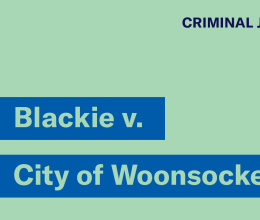The Rhode Island ACLU has today filed a federal lawsuit against the Department of Corrections (DOC), alleging that correctional officials have engaged in a pattern of unconstitutional harassment against inmate Jason Cook after he publicly criticized Department of Corrections’ mail policies and sought legal assistance from the ACLU. The lawsuit, filed by ACLU volunteer attorneys from the law firm of DeLuca and Weizenbaum, details a series of retaliatory and disciplinary actions against Cook who, until he spoke out, had a relatively clean disciplinary record.
Among the sequence of events alleged by the ACLU in the suit:
- In October 2007, a Providence Journal story quoted Cook criticizing a new DOC policy limiting the written materials available to inmates. A week later, he was fired from his kitchen job under the pretext that he was caught on a video camera stealing state property. He was later found not guilty of the charge.
- In February 2008, the RI ACLU intervened on Cook’s behalf in the dispute over the new inmate mail policy by writing DOC officials in support of his position. Shortly thereafter, correctional officers conducted a destructive search of Cook’s cell that damaged some of his personal property.
- After complaining to the DOC’s Office of Inspections about that search, Cook was advised that other inmates in his module with similar complaints should contact the Office. Cook posted a notice to that effect on an inmate bulletin board. A few days later, as a result of that posting, he was disciplined for “engaging in or encouraging a group demonstration and/or activities,” strip searched and taken to segregation. Two weeks later, he was finally given a hearing on the charge, but not allowed to present and/or question any witnesses. In the meantime, the mail policy about which he and the ACLU had complained was rescinded by the DOC.
- Cook was found guilty of the charge and sanctioned with 30 days in segregation and the loss of good time. At the end of the hearing on the charge, the hearing officer turned off the tape recorder of the proceeding and told Cook that “this is what happens when you get the ACLU involved in our business.”
- In May 2008, Cook was once again strip searched and thrown into segregation on the grounds that a letter he had written to the Parole Board was “threatening.” He was held in segregation for almost three weeks without a hearing before being released.
- In September 2008, Cook sent a letter to Corrections Director A.T. Wall protesting the lack of a response to grievances he had submitted. Two days later, Cook was again subjected to a strip search and a cell search where his property was destroyed. Officers also looked through Cook’s legal materials and asked him if he had communicated further with any Providence Journal reporters.
The ACLU lawsuit argues that corrections officials’ actions “in retaliating against Cook for publicly criticizing policy changes at the Rhode Island Department of Corrections” violated his First Amendment right to freedom of speech “and displayed both deliberate indifference and a reckless disregard of Cook’s constitutional rights.” The suit further claims that the various disciplinary actions taken against him violated Cook’s due process rights. The suit seeks a court order declaring these actions unconstitutional, preventing any further retaliation against Cook for exercising his First Amendment rights, and awarding him monetary damages and attorneys’ fees.
RI ACLU volunteer attorney Amato DeLuca said today: “The Constitution does not magically disappear when a Rhode Islander enters the Department of Corrections. The fact that Mr. Cook spoke up and was retaliated against in various ways, including being thrown into isolation for weeks on end, is an outrage. The goal of this lawsuit is to win justice for those like Mr. Cook who are unjustly persecuted for speaking out.”
RI ACLU executive director Steven Brown called the actions taken against Cook “particularly troubling” because corrections officials had similarly retaliated against the last inmate the ACLU represented in federal court, Wesley Spratt. Spratt was challenging a DOC policy, ultimately ruled unconstitutional, that barred him from preaching at religious services at the prison. Spratt too had a virtually clean disciplinary record, but a week after the ACLU argued his case before a judge, Spratt was disciplined on what the ACLU claimed was a bogus charge.
The mail policy at issue that Cook initially protested, and that was ultimately withdrawn after the ACLU intervened, barred family members from ordering books or magazine subscriptions for inmates. Instead, inmates could only obtain publications directly from a publisher with their own funds.








